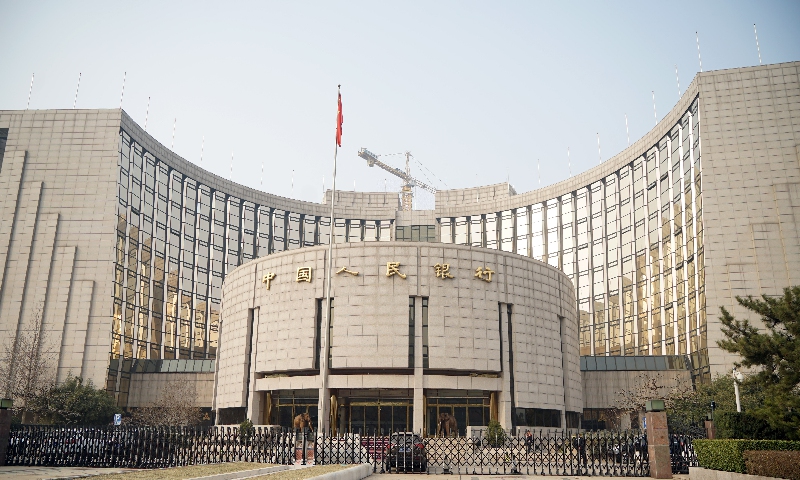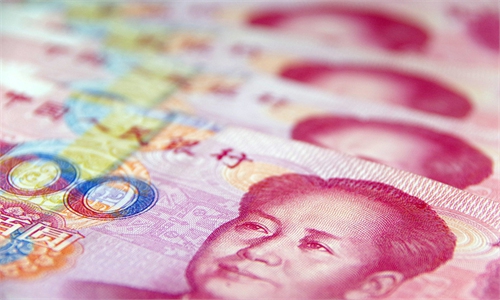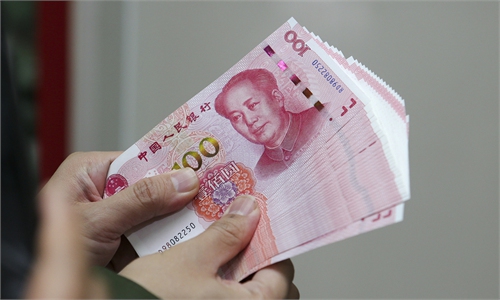China's Aug new bank loans exceed expectations as financial support for real economy increases
Financial support for China's real economy continues to increase

The headquarters of the People's Bank of China (Photo: Xinhua)
New bank loans in China almost quadrupled in August from July to an all-time record of 1.36 trillion yuan ($186.18 billion), the central bank announced on Monday. The figure was far above expectations and showed that the intensive series of macro policies announced in August had an almost immediate effect in boosting market confidence, experts said.
Chinese banks extended 345.9 billion yuan in new loans in July, according to data that the People's Bank of China (PBC) released on Monday. The most recent Reuters market poll had predicted new yuan loans would rise to 1.2 trillion yuan in August.
New loans issued from January to August stood at 17.44 trillion yuan, a year-on-year increase of 1.76 trillion yuan.
The increase of new loans in August reflected a rebound in consumer spending and an optimistic outlook from businesses toward an economic recovery and market demand, Zhou Maohua, an economist from China Everbright Bank, told the Global Times on Monday.
As of August, the cumulative total social financing (TSF), a broad measure of credit and liquidity in the economy that includes bank loans, rose 9.0 percent year-on-year.
"TSF rebounded beyond expectations, primarily driven by the accelerated issuance of local government bonds and a recovery in bond market financing," Zhou said.
Boosted by the data, the onshore and offshore yuan both surged, with intraday highs rising more than 600 basis points, reclaiming most of the lost ground from the previous week's continuous decline.
Besides, major A-share indexes closed higher on Monday with the Shanghai Composite Index up 0.84 percent to 3,142.78 points, the Shenzhen Component Index gaining 0.98 percent to 10,382.38 points, and the ChiNext Index rising 0.65 percent to 2,063.19 points.
Since the beginning of this year, measures to stabilize growth and investment have been continuously adopted. In August, credit growth reached a high point, indicating an increased investment appetite among businesses and investors, which is beneficial for stabilizing market expectations, Dong Shaopeng, a senior research fellow at the Chongyang Institute for Financial Studies at the Renmin University of China, told the Global Times on Monday.
Recent data have also shown signs of improvement in the economy.
The August Manufacturing Purchasing Managers' Index came in at 49.7, up 0.4 points from July, a third consecutive year-on-year increase.
The Consumer Price Index returned to growth from a decline in August while the Producer Price Index narrowed its decrease compared with July, indicating a stabilization and recovery in the overall price level in China.
The improved financial and macroeconomic data came after China stepped up policy support in August to stabilize the economy, stock market and property market, which has boosted confidence.
The PBC made intensive moves to lower policy rates in August. On August 15, the PBC cut the medium-term lending facility by 15 basis points to 2.5 percent in a bid to adjust market liquidity.
To boost the property market, regulators issued policies to reduce down payment ratios and interest rates for existing mortgages.
Chinese authorities also announced policies for the stock market, including cutting transaction fees and halving the stamp duty on trades to boost investor confidence.
New indicators "show that the effects of China's pro-growth policies in promoting consumption, an investment recovery and boosting confidence are gradually taking effect," Zhou said.
Support will be increased in weak areas and key emerging sectors, which will activate the vitality of microeconomic entities, enhance effective investment, promote employment and income improvement, and accelerate the recovery of confidence among households and businesses, Zhou said.


